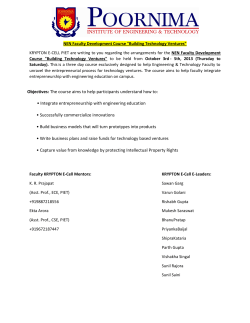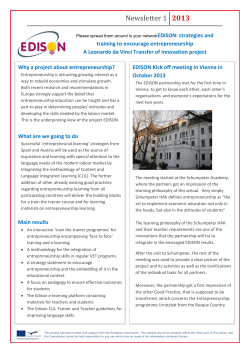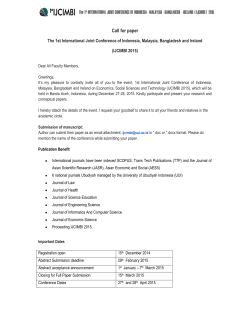
New Ventures and Entrepreneurship BU5850 Course Description
College of Business Administration BU5850 New Ventures and Entrepreneurship Spring 2014 at Waterville Valley Abbreviated Syllabus (Subject to Revision – the complete syllabus will be available on Moodle for enrolled students) Course Description BU5850 New Ventures and Entrepreneurship is an executive-level workshop course. It is designed for people with a near-term interest in starting a new business, although MBA students with the long-term goal of creating their own businesses are certainly welcome. The course is designed to minimize your reading load, all of which precedes our weekend together. The seminar sessions focus on entrepreneurship as a process. In the course you will go through the steps of developing your own business plan, from the defining of your “Concept Kick-Start” through opportunity assessment, market planning, organizational design, operations planning, resource estimation, financial forecasting, and the presentation of your plan to a potential investor. The Pre-Work requires readings, field research for your plan. The seminar contains case studies, guest lecturers, presentations by you and your classmates and workshop sessions. The goal is collaborative … to help each other launch successful ventures. Instructor: Ray England; Phone: 535-2610 E-mail: rengland1@plymouth.edu Plymouth State University; Hyde Hall, Plymouth, NH 03264 Texts and Equipment: 1. Gerber, Michael E. The E-Myth Revisited. HarperCollins, New York, ISBN 978-0-88-730728-7. (A newer edition of this title is fine, but not the book E-Myth Mastery, which is assigned to SBA teams.) 2. Business Plan Pro, ISBN 978-0-07-733065-X* 3. Cases and other readings will be passed out as needed, or posted in Moodle. 4. A working PC. *Note: Business Plan Pro is a software package. I have provided the ISBN of the 15th Anniversary Edition, Version 11, distributed as the McGraw-Hill Academic Edition. Any available version at Version 11 or higher should do fine for our purposes. Mac users may have to buy a special edition. BU5850.WV – Spring 2014 Page 1 Outputs: This is your workshop course. You are doing it for yourself, and for your future business. The only written output will be your business plan, to be delivered as a word file via e-mail to me, on or before Midnight, Friday, April 4th 2014. During our weekend sessions at WV, you will be called upon to describe your project, your prior research findings, and your planning progress to the seminar, from whom you will receive feedback and advice. You will also be expected to contribute orally to our discussions. There will be workshop time at the seminar to modify and edit your plan and to ask questions of the instructor regarding any aspect of your business plan. The software package includes business planning financial models and examples. Grading: This course is really not about your grade. It is about your business plan. But, as grades are needed to give you credit for your efforts, grading will be weighted on two variables: your final business plan 75%, and class participation 25%. Ray England BU5850 New Ventures and Entrepreneurship Course Schedule and WV Agenda (Subject to Change): Date Pre-Work: March ‘14 to March 21 ‘14 Topics Entrepreneurship: Introduction, Process, EMyth Reading, Individual Research into your business idea and its market. Readings The E-Myth Revisited (Entire book) Work Assignments Identify your chosen business. Examine this idea, and determine the market area you will address: local, regional, national, or global. Become familiar with the Business Plan Pro CD and its financial template. Be sure to view the introductory movie, as I found it a helpful 9.2 minutes. Start drafting your plan. Prior to March 7, 2014, send to me via e-mail a 1 page Executive Summary of your Business Plan (i.e. Description of the Business Venture, the type of Product / Services along with a financial “Overview Sheet” to test your business model) The following assignments are to be done prior to, and in preparation for, the dates shown: Day 1: March 21 AM: Presenting Our Business Ventures PM: Case on business planning, Meeting An Entrepreneur (TBA) Eve: Entrepreneurship Speaker (TBA) BU5850.WV – Spring 2014 Write out your business idea. Where and what business will you start? Define your target customer. How will you reach that customer? Define your business system. Prepare a financial “Overview Sheet” to test your business model: Who will pay you how much for what? Why will they want to pay you? How much sales volume will it take for you to achieve your target income? Etc. Prepare to present this idea to the seminar, and to discuss the financial feasibility of the business. Page 2 March 22 March 23 March 24 to April 4th AM: Small Business Financing and Legal Concerns (Speakers TBA) PM: Business Planning Workshop Evening: Group reflection & workshop. Begin revising and improving your business plan. Continue tuning up the financial plan. Oral Presentations (The Plan and the elevator speech). Saturday evening prep: Tune your draft business plan. Then, prepare to present your plan in 15 minutes or less, starting with a 30-second “elevator speech” designed to make us all want to hear more. (During our afternoon session we will work together on using the financial models). Complete your written plan. Keep it business like, remembering that “business like” means “calm, factual, clear, brief and honest.” Your plan should be well laid out, easy to follow, and convincing. If you are seeking outside financing, your plan should tell the potential investors what is in it for them. When it is complete, but not later than midnight on April 4th, e-mail me your completed plan as a Word file Called “Business Plan – Your Name - Date” in the e-mail subject area. I will confirm receipt. I leave you with these thoughts: “Happiness is a positive cash flow.” “The number of times I succeed is in direct proportion to the number of times I can fail and keep on trying.” -Tom Hopkins “You have everything you need to build something bigger than yourself.” -Seth Godin BU5850.WV – Spring 2014 Page 3
© Copyright 2025





















